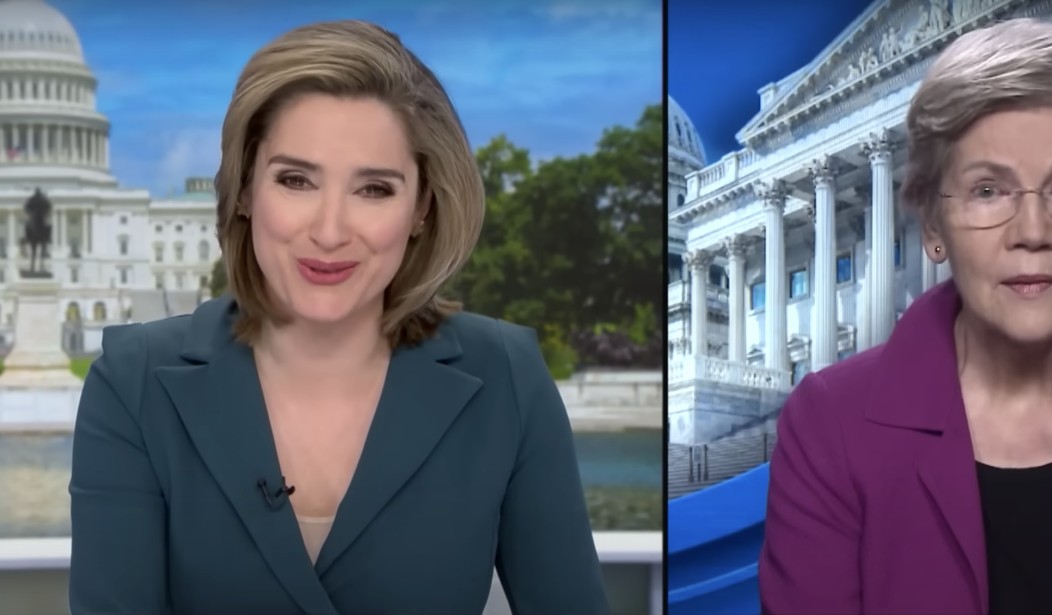Sen. Elizabeth Warren (D-Mass.) appeared on the Sunday circuit to discuss, primarily, the recent Silicon Valley Bank (SVB) collapse and its implications for the health of the overall economy.
The CBS news actress, Margaret Brennan, starts by asking Elizabeth Warren whether one of the “too big to fail” banks (her words) should be permitted to buy up SVB.
News actress: “Do you think that in order to stop the bleeding, one of those big banks too big to fail, needs to be able to buy up that smaller bank?”
Already, this is suspect framing. Allowing one of the already “too big to fail” banks to gobble up a greater share of the banking sector would only incentivize more of the casino-gambling shysterism that produced the 2007/08 crash in the first place.
Warren attempts to respond with a little backstory of how SVB’s collapse occurred, which didn’t happen in a vacuum. There are clear policy reasons the bank crashed.
Warren: “Remember that back in 2016, the CEOs of these banks, of these multibillion-dollar size banks, came to Washington, they’re lobbying for lighter regulation….”
The news actress interrupts, probably at the behest of a panicked producer in her ear, seemingly uninterested in the actual cause of the collapse. Her primary interest, as indicated throughout the interview by her line of questioning, is to allow for further monopolization of the banking industry.
News actress: “Well, I’m talking about the crisis that we’re in right now, though. I appreciate where you’re going there, but can we just start on the bleeding that we are seeing in the banking sector right now, like you just said, to shore up the banks. To shore them up, do you need to allow for a merger? And is there any other white knight who could come in to save one of these regional banks, like First Republic?”
The corporate media always employs this strategy: something goes terribly wrong politically, usually as a result of corruption and malfeasance on the part of the state and the corporation (which are increasingly one and the same in an unholy union). Then, instead of diagnosing the problem, the corporate media focuses solely on the “solution” to the problem, which is usually more of the same disastrous policy that caused the problem in the first place.
Around and around we go, treated to crisis after crisis. No one learns any lessons and no consequences are meted out to responsible parties.
The rest of the interview goes on like that.
At one point, the news actress asks Warren rhetorically: “Do you worry though, in this moment, where we have this crisis of confidence that you are sowing more distrust of the federal government right now?”
What in the world does that mean? Who in their right mind would trust the federal government, now or ever?
I’m by no means a fan of the fake Native American Senator. But as long as I’m allowed to acknowledge reality, she — at least in rhetoric — is one of only a handful of national-level elected representatives that criticizes the parasitic banks, for which she deserves credit. She’s always been strong in her rhetorical approach to handling America’s multinational banker problem.
This idea is a hard sell because it contradicts Republican orthodoxy, but not all regulation is bad — some of it, perhaps most, but not all.
The multinational bankers need to be kept on a tight leash. They do not represent American interests. Mainstream Democrats and Republicans are far too lenient with these people and the undue power they wield over the U.S. economy.
“Too big to fail” is not the free market ideal. It means the forced government subsidization of banks that hold a metaphorical gun to the American people’s heads every few years when their illicit gambling operation hits the rocks.
What happened to not negotiating with terrorists?










Join the conversation as a VIP Member